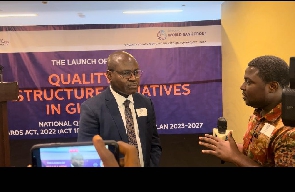 Professor Alex Dodoo, Director General of the Ghana Standards Authority
Professor Alex Dodoo, Director General of the Ghana Standards Authority
Professor Alex Dodoo, Director-General of Ghana Standards Authority (GSA), says the GSA is implementing a five-year strategic plan from 2023 to build an efficient, people centred, and financially sustaining institution, which will be visible through decentralised, digitised and modern operational structures by 2027.
The strategic plan is a medium-term vision to have the GSA to operate as a decentralised, fully-digitised, modern and regimented institution enforcing its mandate optimally.
He announced this during the GSA national sensitisation programme on National Quality Infrastructure initiatives held in Tamale.
The event, supported by the World Bank Group under the Ghana Economic Transformation project, and in partnership with Ministry of Trade and Industry and Ministry of Finance, was to engage stakeholders on the GSA to deliberate upon the implications of the recently enacted GSA Act 2022 (ACT 1078) and the National Quality Policy.
Professor Dodoo stated that the strategic plan was expected to achieve pre-determined revenue growth targets, and build on improved efficiency of its operations.
He said that the strategic plan would also be modernised and its processes and procedures built-up for a world class quality information institution, enhance its visibility as a quality infrastructure institution to promote the function of the GSA.
He said the GSA partnered Food and Drugs Authority with support from World Bank Group under the Ghana Economic Transformation project to organise free registration of 100 women, who were sole proprietors, to promote women’s livelihoods across the country.
He announced that GSA would, in addition, establish a laboratory in Tamale to address some of its challenges such as the delay of registration process due to the workload at the head office.
Mr Clifford Frimpong, Deputy Director-General of Conformity Assessment at GSA, stated that the policy covered the main internationally recognised elements of the National Quality Infrastructure.